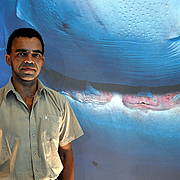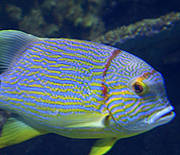Reef resilience key to fight climate change
11 October 2008 | News story
What is the best way to make coral reefs more resilient against climate change? That was the burning issue of the IUCN World Conservation Congress for Dr. David Obura, Director of CORDIO (Coastal Oceans Research and Development in the Indian Ocean) East Africa.
“With continuously increasing human population pressures and changes in the earth’s climate, natural resource managers face an urgent need to better understand how the world is changing, from local to global levels, and how to develop meaningful management strategies to cope with change and maintain natural processes,” he said.
“This need is particularly critical for coral reefs, which are highly complex and diverse systems and vital to the welfare of large human populations throughout the tropical world, and among the most vulnerable ecosystems to global changes.”
The workshops run at the IUCN World Conservation Congress aimed to highlight successes and problems in measuring resilience and using the knowledge in a management framework.
IUCN member CORDIO works with partner organisations to improve coastal people’s quality of life and alleviate poverty through monitoring and research of coral reef environments and the development and promotion of sustainable livelihoods.
“CORDIO uses science to help fisherman learn tools to better protect their marine environment,” said David. “This is often challenging as we rely on the consensus among the villagers and many are wary of environmental organisations as they see us as a threat to their livelihood.
“Over time, through dialogues and by using local organisations, we build relationships and raise awareness of the dual benefits of sustaining natural resources. We have had some really positive results such as fisherman volunteering to stop using destructive fishing nets.
“We can also play an intermediary role between the local government and fisherman to resolve conflict; proving information based on science and encouraging the two groups to work together.”
CORDIO works in 14 countries of the Indian Ocean, covering East Africa (Kenya, Tanzania, Mozambique, South Africa), South Asia (India, Sri Lanka, Maldives), Southeast Asia (Thailand, Indonesia) and the Indian Ocean islands (Seychelles, Mauritius, Madagascar, Comoros, Reunion), and has been active since 1999.






